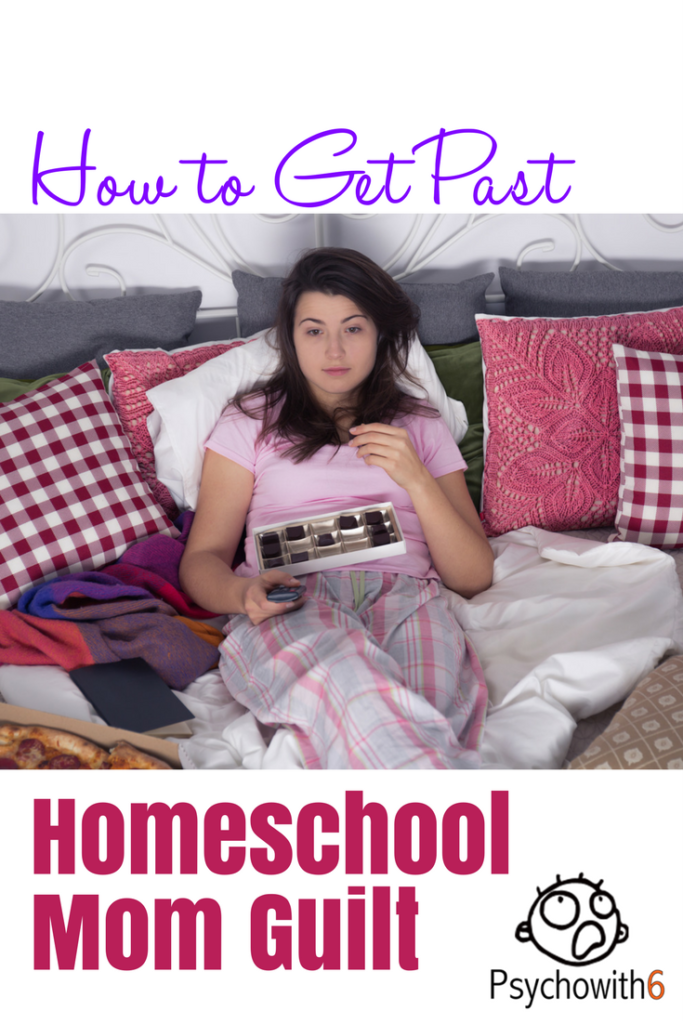Do you ever feel guilty as a homeschool mom? If you’re anything like me, you’re well acquainted with guilt. How can we get past the guilt that plagues us?
The Purpose of Guilt
Before we can think about ways to get past guilt, we need an understanding of how guilt is to function in our lives. Guilt is like a warning light designed to get us back on track. When that warning indicator is functioning correctly, we can make the changes we need to make and that indicator will disappear. If you’ve ever had a car like I have that has an indicator that goes off inappropriately or constantly, you know how annoying it can be. Sometimes our guilt is not an accurate indicator. When we’ve clearly done something wrong, guilt can drive us to apologize or change our behavior. But inappropriate guilt is like that annoying, always-on indicator in the car. We try to ignore it, but we often wonder if there really is a problem we need to address. Inappropriate guilt takes our focus off of what we need to be doing.
If a warning light on my car keeps going off, I can take my car to the shop and have it tested. The problem can either be fixed or the indicator can be turned off. But what do we do about guilt that keeps popping up? There’s no guilt shop to go to, or is there?
My contention is that if we allow God’s Word to diagnose our guilty indicator, we will often find either a quick solution or discover that our guilt is the only real problem. When we allow the world’s standards to determine whether our guilt is a real problem or not, we will likely drive through our homeschooling lives constantly feeling guilty.
Now that we understand the problem of guilt in our lives, what do we do about it?
The first thing we can do is confess.
If we have done something that God’s Word would say is worthy of guilt, the next step is confession. We are to confess our guilt to God, but we may not want to stop there. We may need to confess our guilt to our families, our friends, or anyone who has been affected by our behavior.
Confession makes sense if our behavior is worthy of guilt, but what if it isn’t? Confession can also work in that circumstance. When we confess to our spouse or our homeschooling friends something we feel guilty about, these godly individuals can help us discern whether the guilt is appropriate or not. My husband has been wonderful in helping me determine appropriate versus inappropriate guilt. He will reason with me and help me release inappropriate guilt. However, he has also pointed me toward changing when he feels my guilt is appropriate. Talking with my homeschooling friends and determining that the standards I have for myself are much too high has also been a very effective way for me to release inappropriate guilt. I highly recommend it. I’ve seen the moms in our HomeschoolScopes.tv Facebook group do this for one another.
I’d like to share a personal example with you. I have sometimes felt guilty that my children don’t have as many friends as kids in school do. My homeschooling mom friends have helped me to let go of that guilt. Children don’t require a large number of friends and I am providing my kids with the best education I can in the most loving, social environment possible.
Do the good you ought to do.
The second way we can get past guilt is to do the good we ought to do. We can instantaneously feel better by making even a small step in the right direction. If you know the right thing is to teach your children their math facts and you’ve been avoiding it and feeling guilty, the easiest way to get past the guilt is to go over those math facts. In fact, doing something you’re reluctant to do, for whatever reason, is much less painful than living with the guilt. Think about what one small step you could take in the right direction that would relieve your guilt and take it today. Don’t put it off!
Of course, if you are suffering with inappropriate guilt, then acting on that guilt is not the right step to take. After spending time in prayer, reviewing God’s word, and confessing your guilt to people you trust, discern whether or not you are suffering from inappropriate guilt. If you are, continue with the remaining steps.
Avoid situations that encourage inappropriate guilt.
Step three is to avoid situations that encourage inappropriate guilt. It’s harder to avoid the situations that lead to an errant indicator in your car, but it is possible to avoid them as homeschooling moms. Is there a certain someone who makes everything from scratch, does elaborate science experiments, or is one of those homeschooling wonder women? If so, you may need to avoid her until you get your inappropriate guilt under control. Likewise, you may need to take a break from social media. The perfect Pinterest Photoshopped images may give you guilt. If understanding that these images don’t represent real life doesn’t relieve your guilt, take a break from Pinterest. Do the same with Facebook, Instagram, or YouTube.
Consider who you are in the body of Christ.
The next step is to consider who you are in the body of Christ. I have a sister-in-law who shares the Gospel with nearly every person she meets. Numerous times I have felt guilty that my witnessing is paltry in comparison. But then I go to God’s Word and I am in prayer and I discover that God has given each of us a part to play. We are not all called to the same works. Imagine if we were! What a mess it would be. I can feel good about who God created me to be and the part He created me to play. I don’t have to compete with my sister-in-law’s way of witnessing or feel guilty when I don’t even try. Think about the gifts, talents, and interests you have. Would you want your loved ones to feel guilty if they don’t share those? I’m sure the answer is no. Treat yourself the way you would treat someone you love and let go of the guilt.
Lower your standards.
The fifth step is lower your standards. I had a friend whose defibrillator fired in her chest when her heart rate reached a certain level. That firing understandably caused pain and anxiety. Her doctor determined that the standards set for the defibrillator needed to be changed. It shouldn’t have fired. Like that defibrillator, some of us have to change our standards so as to avoid pain, anxiety, and guilt. One of the most common reasons for our standards being too high is that we don’t really believe we are acceptable. We haven’t fully trusted in the finished work of Jesus Christ in our lives. For most of us, this is subconscious. We are working and trying and striving as I discussed in my post on when strivings cease. The result is anxiety, stress, and guilt.
One of the most stressful situations for a homeschooler is being evaluated. Some homeschoolers are evaluated every year in their state, while others are never evaluated unless there is a legal problem. Imagine how you would feel if your homeschool had been evaluated and certified as fully acceptable. I believe in that case, we would feel free to homeschool without fear or guilt. While our homeschools probably haven’t been certified by an outside agency, we can know that we are fully acceptable to God–not because of anything we’ve done but because of what Jesus has done. He continues to work in us and through us and because He does, we can have freedom from inappropriate guilt. We can homeschool with peace and joy, knowing He is in control of our homeschool.
Homeschool in love.
The final tip I want to share with you for getting past guilt is homeschooling in love. It’s hard to make homeschool decisions. We often don’t know what the priority is, what the best classes or curriculum are, or how we should be spending our time. But love is always the right choice. When our homeschooling is done in love for God, for our families, and even for ourselves, we will be free from guilt. Let me explain that last part about loving ourselves. Genuine love should provoke no guilt. Love means providing the same time, opportunities, and gifts to ourselves that we would provide to anyone we love. Feeling guilt over taking time alone, to be with friends, or to engage in hobbies that renew us makes no sense because these things enable us to love others. Jesus never appeared to feel guilty over resting or being alone.
Allowing ourselves to be ruled by inappropriate guilt can lead to physical, emotional, and spiritual dysfunction. If we do not take steps to get past guilt, whether that is appropriate or inappropriate guilt, we do our families, our friends, and our Lord a disservice. We don’t model a healthy approach to guilt and we do not fulfill God’s purposes for our lives and our homeschools.
Conclusion
In conclusion, it is possible to get past guilt. When guilt is appropriate, we can confess it and make changes. We can feel instant relief. When guilt is inappropriate, we can avoid situations that encourage guilt, consider our role in the body of Christ, lower our standards, and focus on homeschooling in love — including loving ourselves.
What makes you feel the most guilty as a homeschool mom and which of these steps is most likely to help you get past it?







